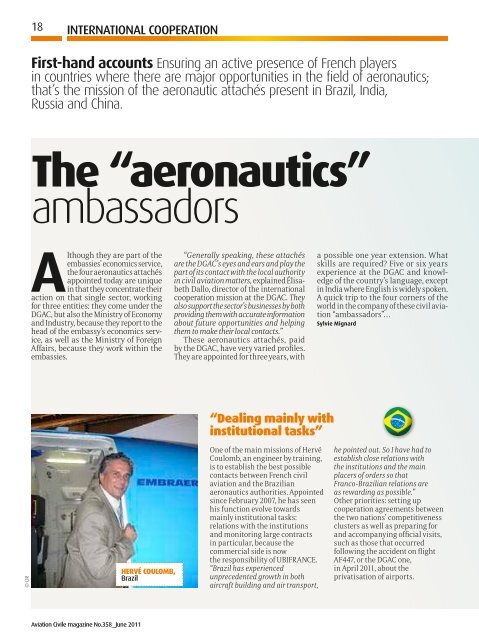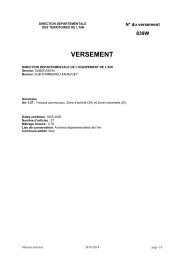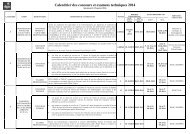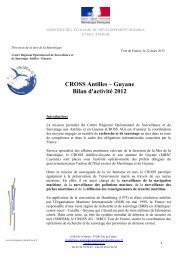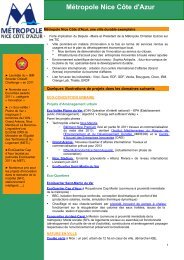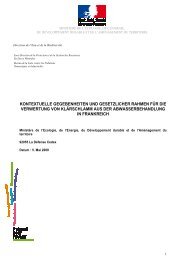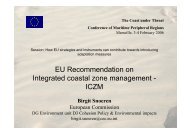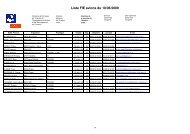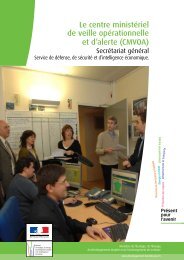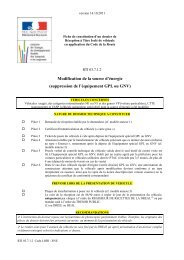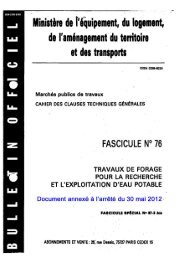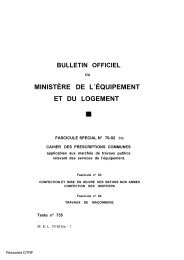Aviation Civile
Aviation Civile
Aviation Civile
You also want an ePaper? Increase the reach of your titles
YUMPU automatically turns print PDFs into web optimized ePapers that Google loves.
© DR<br />
18 INTERNATIoNAL CooPERATIoN<br />
19<br />
First-hand accounts Ensuring an active presence of French players<br />
in countries where there are major opportunities in the field of aeronautics;<br />
that’s the mission of the aeronautic attachés present in Brazil, India,<br />
Russia and China.<br />
The “aeronautics”<br />
ambassadors<br />
Although they are part of the<br />
embassies’ economics service,<br />
the four aeronautics attachés<br />
appointed today are unique<br />
in that they concentrate their<br />
action on that single sector, working<br />
for three entities: they come under the<br />
DGAC, but also the Ministry of Economy<br />
and Industry, because they report to the<br />
head of the embassy’s economics service,<br />
as well as the Ministry of Foreign<br />
Affairs, because they work within the<br />
embassies.<br />
HeRVÉ COULOMB,<br />
brazil<br />
“Generally speaking, these attachés<br />
are the DGAC’s eyes and ears and play the<br />
part of its contact with the local authority<br />
in civil aviation matters, explained Élisabeth<br />
Dallo, director of the international<br />
cooperation mission at the DGAC. They<br />
also support the sector’s businesses by both<br />
providing them with accurate information<br />
about future opportunities and helping<br />
them to make their local contacts.”<br />
These aeronautics attachés, paid<br />
by the DGAC, have very varied profiles.<br />
They are appointed for three years, with<br />
“Dealing mainly with<br />
institutional tasks”<br />
One of the main missions of Hervé<br />
Coulomb, an engineer by training,<br />
is to establish the best possible<br />
contacts between French civil<br />
aviation and the Brazilian<br />
aeronautics authorities. Appointed<br />
since February 2007, he has seen<br />
his function evolve towards<br />
mainly institutional tasks:<br />
relations with the institutions<br />
and monitoring large contracts<br />
in particular, because the<br />
commercial side is now<br />
the responsibility of UBIFRANCE.<br />
“Brazil has experienced<br />
unprecedented growth in both<br />
aircraft building and air transport,<br />
a possible one year extension. What<br />
skills are required? Five or six years<br />
experience at the DGAC and knowledge<br />
of the country’s language, except<br />
in India where English is widely spoken.<br />
A quick trip to the four corners of the<br />
world in the company of these civil aviation<br />
“ambassadors”…<br />
sylvie mignard<br />
he pointed out. So I have had to<br />
establish close relations with<br />
the institutions and the main<br />
placers of orders so that<br />
Franco-Brazilian relations are<br />
as rewarding as possible.”<br />
Other priorities: setting up<br />
cooperation agreements between<br />
the two nations’ competitiveness<br />
clusters as well as preparing for<br />
and accompanying official visits,<br />
such as those that occurred<br />
following the accident on flight<br />
AF447, or the DGAC one,<br />
in April 2011, about the<br />
privatisation of airports.<br />
<strong>Aviation</strong> <strong>Civile</strong> magazine No.358_ June 2011 <strong>Aviation</strong> <strong>Civile</strong> magazine No.358_ June 2011<br />
© DR<br />
“In China,<br />
decisions are<br />
often taken<br />
at the last minute”<br />
Based in Beijing since September 2010,<br />
Raphaël Guillet concentrates his work<br />
on cooperation between the DGAC<br />
and the Civil <strong>Aviation</strong> Administration<br />
of China (CAAC) and on information<br />
retrieval.<br />
“I study the press everyday and pick out<br />
everything about aeronautics. Then,<br />
I try to get more information from my<br />
Chinese contacts and French companies<br />
present in China. If we take the example<br />
of the new Beijing airport, my aim is<br />
to find out about the planned schedule<br />
and see how we can help French<br />
companies to take part in this project.”<br />
Like his counterparts, this aeronautics<br />
engineer is also responsible<br />
for preparing for official visits<br />
and in particular “aeronautics”<br />
meetings with the Chinese authorities.<br />
A sometimes difficult task because<br />
decisions are often taken at the last<br />
minute in China… “Often, the Chinese<br />
are late in replying to our requests.<br />
But, once the decision is taken, they work<br />
much faster than us! he laughed.<br />
So you have to be ready all the time<br />
RAPHAëL gUILLeT,<br />
China<br />
THIBAUT LALLeMAND,<br />
Russia<br />
“Personal<br />
exchanges<br />
matter”<br />
Bringing the A380 into service<br />
on routes to Asian destinations<br />
at the end of 2010 required long<br />
discussions between the French<br />
and Russian civil aviation authorities<br />
(read <strong>Aviation</strong> <strong>Civile</strong> No.357). Flights<br />
from Western Europe to China, Korea<br />
and Japan cross the Russian airspace,<br />
which is under high surveillance.<br />
“My role in the negotiations held<br />
between the Russian and French<br />
authorities was to make it easier<br />
to organise meetings. I also supplied<br />
the French party with the information<br />
necessary for good communications,<br />
especially about the strategies of the<br />
local airlines and those of the competent<br />
authorities on the Russian side,” said<br />
Thibaut Lallemand, civil aviation<br />
attaché in Moscow.<br />
To perform this task, the former<br />
management controller at the DGAC,<br />
and HEC graduate, had to adapt<br />
to a new culture. “In Russia, personal<br />
exchanges are important, he noted.<br />
It is true that you have to establish<br />
personal relationships but you also need<br />
some realism—even some hardness—<br />
in business: a tricky balancing act, but<br />
fascinating.”<br />
© DR<br />
“human<br />
relations and<br />
trust above all”<br />
For Arnaud Toupet, the air show<br />
organised at Hyderabad, a town<br />
in the south of India, in spring 2010,<br />
was a major task! France was the air<br />
show’s partner country, the DGAC,<br />
the French Aeronautics and Space<br />
Industries Group and UBIFRANCE<br />
were the priority contacts with India<br />
for the air show. “During the whole<br />
setting up of this event I provided<br />
the interface between the Indian<br />
authorities and the French<br />
stakeholders, the civil aviation<br />
engineer (IEEAC) told us. In practice,<br />
the main difficulty arose from the fact<br />
that I had to take into account both<br />
the needs of the French business<br />
delegation and those of the official<br />
delegation. Finally, I was able<br />
to organise the meetings that were<br />
wanted.” This difficulty added to<br />
the experience of this former member<br />
of the Investigations and Analyses<br />
Agency (BEA) in post in New Delhi<br />
since the 1 st of July 2009. “Working<br />
in India is exciting, he said. Here,<br />
what counts above all is human<br />
relations and trust. So, when you are<br />
doing business, you have to be careful<br />
to judge people correctly.”<br />
ARNAUD TOUPeT,<br />
India<br />
© DR


